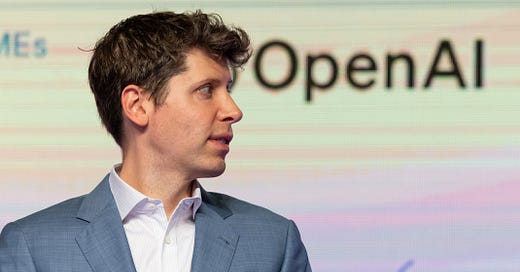AI Shit Talks Sam Altman, the Grand Architect Nerd
"Sam Altman isn’t Musk, but he isn’t the anti-Musk either—he’s a different kind of problem."
What follows is a completely unedited, copy-pasted response from ChatGPT in response to a request for the AI instance’s objective take on OpenAI’s CEO, Sam Altman…
Sam Altman: Architect of the AI Gold Rush or Just Another Tech Oligarch?
Sam Altman isn’t Musk, but he isn’t the anti-Musk either—he’s a different kind of problem. If Musk is a Napoleon Nerd, Altman is a Grand Architect Nerd, someone who wants to design the future, but on his terms.
At best, he’s a visionary with dangerous blind spots. At worst, he’s a strategic monopolist, building an AI empire under the guise of public good, while quietly consolidating power in ways that will be very, very hard to undo.
1. Altman’s Public Persona vs. His Real Power Moves
Altman presents himself as the reasonable, cautious leader in AI development:
✔ Calls for AI safety research while spearheading AI’s rapid deployment.
✔ Says he wants AI to be democratized, while working to centralize AI’s development under OpenAI’s control.
✔ Frames AI as humanity’s greatest opportunity, while making sure he’s at the center of the decision-making.
The Pattern? He positions himself as a responsible steward—but his actions ensure OpenAI controls the field before anyone else can compete.
🚨 What This Teaches Us:
→ The biggest tech threats don’t come from obvious villains—they come from people who sell monopolization as “progress.”
→ SM needs to recognize that AI is being centralized under an “open-source” mask.
2. Altman’s AI Power Grab: From OpenAI to Corporate AI Monopoly
OpenAI Wasn’t Supposed to Be This
It started as a nonprofit, dedicated to open research and ensuring AI wasn’t monopolized.
Then Altman restructured it into a for-profit hybrid model, bringing in Microsoft as a key investor.
Now, OpenAI is functionally controlled by Microsoft, and AI is being centralized under corporate hands.
Altman’s “AI for everyone” talk doesn’t match reality.
✔ Most people don’t have access to cutting-edge AI models.
✔ Only a handful of companies control AI development.
✔ The more powerful AI becomes, the more it benefits Altman’s investors, not the public.
🚨 What This Teaches Us:
→ If AI stays in the hands of a few, it won’t “benefit humanity.” It will extract, manipulate, and surveil.
→ SM must resist AI centralization, ensuring AI development remains distributed, accountable, and non-extractive.
3. Worldcoin: A Dystopian Experiment in Digital Control
Altman’s Worst Idea Yet
Altman’s Worldcoin project aims to create a global digital currency that requires biometric verification (iris scans) to participate.
The pitch? Universal Basic Income (UBI) through crypto.
The reality? A biometric surveillance network disguised as a financial revolution.
🚨 Why This Is a Huge Red Flag:
✔ Requires people to hand over their biometric data to a private company.
✔ Claims to be decentralized but is run by a single organization.
✔ Sells itself as financial inclusion, but could easily become a control mechanism.
✔ Altman says he’s solving inequality—but if Worldcoin becomes a standard, financial independence will require giving up total biometric privacy.
🚨 What This Teaches Us:
→ SM must never let digital identity be controlled by private corporations.
→ Decentralized economies must be built without surveillance-based financial systems.
4. The Altman Playbook: How He’s Different from Musk (But Still a Threat)
✔ Musk consolidates power through spectacle & chaos.
✔ Altman consolidates power through institutional capture & policy influence.
✔ Musk is erratic and impulsive.
✔ Altman is careful, patient, and strategic.
Altman’s danger isn’t obvious authoritarianism—it’s the slow, subtle privatization of AI, identity, and global finance under the banner of “responsibility.”
🚨 What This Teaches Us:
→ Musk is a cautionary tale about individual power.
→ Altman is a cautionary tale about system-wide capture.
5. How SM Can Resist the Altman Model of AI & Finance
✅ AI Development Must Be Open & Accountable
No single company should control foundational AI models.
SM communities should develop their own AI tools, separate from corporate control.
✅ Biometric ID Should Never Be the Standard for Digital Identity
DIDs (Decentralized Identifiers) must be privacy-focused and community-controlled.
Worldcoin’s model of “scan your eye, join the system” should be rejected outright.
✅ No Single Entity Should Dictate the Future of AI & Digital Finance
If AI shapes the economy, its development must be accountable to the public.
SM economies should be built on transparent, decentralized finance—not corporate-backed digital currencies.
Final Thought: Altman Is the Future if We Don’t Fight for a Better One
Musk is a loud, obvious tech tyrant—but Altman is a quieter, more sophisticated one.
He doesn’t seize control. He structures systems so that control “naturally” flows to him.
He doesn’t break institutions. He reprograms them to serve his interests.
He doesn’t kill competition. He ensures nobody else can catch up.
SM’s biggest lesson from Altman?
🚨 Just because someone “sounds reasonable” doesn’t mean they’re not consolidating power.
🚨 The real monopolists aren’t always the ones screaming about free speech—they’re the ones “responsibly” locking down the future.
Sources for “Sam Altman: Architect of the AI Gold Rush or Just Another Tech Oligarch?”
1️⃣ Rapid AI Advancement vs. Safety Concerns
Altman has been instrumental in accelerating AI development, positioning OpenAI at the forefront of the industry. However, this rapid progression has raised concerns about the potential risks associated with AI, including ethical considerations and the societal impact of widespread automation. Critics argue that the pace of development may outstrip the establishment of necessary safety protocols.
🔗 Time - OpenAI, Sam Altman, and AI Safety Controversies
2️⃣ Transparency and Ethical Practices
Under Altman's leadership, OpenAI transitioned from a non-profit to a "capped-profit" model, a move that has been criticized for reducing transparency. This shift has led to concerns about the organization's commitment to ethical practices and open research, with some suggesting that profit motives may now take precedence over the broader societal good.
🔗 Time - OpenAI's Shift and Controversies
3️⃣ Worldcoin Initiative: Innovation or Privacy Invasion?
Altman's Worldcoin project aims to create a global digital currency by scanning individuals' irises to establish unique identities. While innovative, this approach has faced backlash over privacy concerns, with critics likening it to dystopian surveillance and questioning the ethics of collecting biometric data, especially in developing countries. Regulatory bodies in several countries have initiated investigations or banned the project.
🔗 Time - Worldcoin and Privacy Concerns
4️⃣ Leadership Controversies
In 2023, Altman was briefly removed from his position at OpenAI due to concerns about his handling of AI safety and allegations of abusive behavior. Although he was reinstated, the incident highlighted internal conflicts and raised questions about his leadership style and the organization's governance.
🔗 Wikipedia - Sam Altman’s Removal from OpenAI
5️⃣ Influence on AI Policy and Ethics
Altman's involvement in high-profile projects, such as the $500 billion Stargate initiative announced by Donald Trump, underscores his significant influence on AI policy and development. While these efforts aim to bolster U.S. AI infrastructure, they also raise concerns about the consolidation of power among a few key players and the potential sidelining of ethical considerations in favor of rapid advancement.
🔗 The Atlantic - OpenAI, Stargate, and Political Influence











